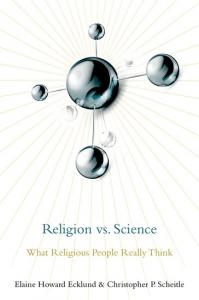 Of course, in asking this question it is important to define what is meant by “creationist.” Most evangelicals do believe that God created the world and continues to be involved in his creation. However, if we define a creationist as a young earth creationist – one who is a certain that God created the universe, the Earth, and all life within the past 10,000 years – then Ecklund and Scheitle (Religion vs. Science) find that only 28 to 29% of self-identified evangelicals fit cleanly into this category
Of course, in asking this question it is important to define what is meant by “creationist.” Most evangelicals do believe that God created the world and continues to be involved in his creation. However, if we define a creationist as a young earth creationist – one who is a certain that God created the universe, the Earth, and all life within the past 10,000 years – then Ecklund and Scheitle (Religion vs. Science) find that only 28 to 29% of self-identified evangelicals fit cleanly into this category
Turning that around, more than 71% of evangelicals are not ‘true believers’ in young earth creationism. Some of these individuals lean toward young earth creationism, but they are not certain it is the correct view and are open (to varying degrees) to other possibilities. Many hold to some form of old earth creationism, progressive or evolutionary. Looking at religious individuals more broadly, “Among those respondents who said “I know God exists and have no doubts about it,”36.1% also said the young-earth creationist narrative is definitely true.” (p. 79) Again turning this around, 63.9 % certain of God are not certain of young-earth creationism.
There are some key convictions however. The first is that God is involved in the process of creation. 70% of evangelicals agree that God is actively involved in the world. Many are also convinced that there are phenomena for which natural explanations will never be found.
Second: Human beings are special and sacred. Ecklund and Scheitle note: “A number of religious individuals separated human evolution from the evolution of other animals to keep from violating the idea that humans were created in the image of God.” (p. 84) This goes even further:
Many religious believers have no problem accepting microevolution, but macro evolution, which occurs on a much larger timescale, is more difficult to accept because it appears to have significant implications for who humans are. While many religious individuals accept the idea that species change over time, they reject the idea that humans evolved from other species. The primary motivation behind this view appears to be keeping humans apart from the rest of creation in the evolutionary process, believing this is necessary to maintaining a special relationship between the creator and human beings. Time and time again in our interviews, we heard Christians, Jews, and Muslims trying to maintain, in the face of scientific thinking and evidence, the belief that God created humans as they are now. (p. 84)
Third, randomness causes problems. As one pastor-in-training put it: “I just don’t see how totally random processes could have gotten us here.” (p. 85) For Christians, Jews, and Muslims there is a purpose to creation and a purpose for our existence. On the other hand, for many people the concept of randomness implies a lack of direction and purpose. Among other things, the vocation to be God’s image and likeness gives purpose to life. Two evangelicals interviewed commented: “I help others … to glorify the one who created me, in his image.”(p. 86) And “We don’t kill every mentally handicapped child, but we care for them. … And we sacrifice for them. To me, that’s evidence of God’s fingerprints.” (p. 87)
Lessons. A subset of evangelicals hold firmly to young earth creationism, a smaller subset sees no problem with natural evolution. Ecklund and Scheitle conclude “But the views of the bulk of the religious population, including evangelicals, are harder to pin down. They are not committed to any particular origins narrative; they are open to multiple narratives so long as key theological understandings are not threatened.” (p. 87)
For scientists (religious or not) who wish to communicate science to a broader public, including religious Americans, the lesson is clear. Draw a distinction between scientific conclusions and metaphysical conclusions. Using words like purposeless, impersonal, unsupervised, and random* to describe evolution can prevent others from listening to or understanding the scientific arguments.
Evolution involves the selection of small variations that enhance the probability of survival. Many of my colleagues believe that this is random and purposeless, many others believe that it is somehow directed or consistent with some kind of purpose. In general their science is independent of their metaphysical points of view.
For Christians, and especially those of us who wish communicate the coherence of science and faith, the lesson is somewhat different. Sometimes it is important to focus on the science, to explain the depth of the evidence behind the age of the Earth (4.7 billion years) and for evolution as the mechanism behind the diversity of life. It can also be useful to counter the indefensible claims of some young earth creationists (Joel Duff at Naturalis Historia does this quite well). It is usually more productive, however, to focus on the theological questions and implications. If these are answered, the science is uncontroversial – it doesn’t really matter to the average Christian.
Does it surprise you that ‘true believers’ in creationism are in the minority – even in evangelical circles?
What are the primary issues in the discussion of origins?
If you wish to contact me you may do so at rjs4mail[at]att.net
If interested you can subscribe to a full text feed of my posts at Musings on Science and Theology.















